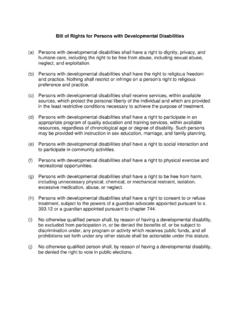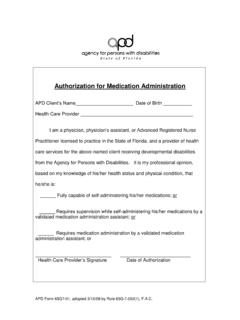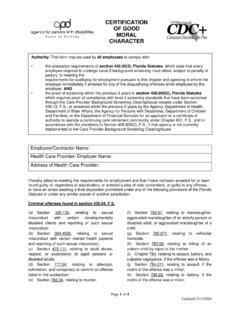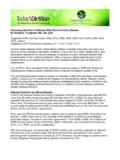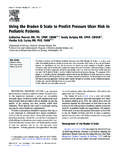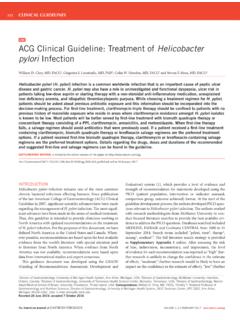Transcription of Medical Causes of Maladaptive Behavior in ASD - …
1 Medical Causes of Maladaptive Behavior in ASD. Vicki Martin, RN. Specialized Nurse Consultants, LLC. 18th Annual Family Caf June 10 2016. Objectives To give tools to assess autistic individuals for Medical problems that could present as Maladaptive behaviors To provide participants with the means to identify when to suggest a referral and who is the appropriate HCP. To illustrate potential dysfunctions that have been linked to autism and comorbid Medical disease in the peer reviewed literature Medical or Behavioral? Why is she/he acting this way? People with autism require a specialized Medical approach to diagnose underlying disease DO NOT DISMISS BEHAVIORS AS JUST THE AUTISM.
2 Anyone with training in Behavior analysis knows that ruling out a physiological function of Behavior is the first step when doing a FBA. THIS IS EASIER SAID THAN DONE! Why? Almost all patients referred for a GI work-up have a normal physical exam. In fact, a normal physical exam should not exclude GI issues or a referral to a gastroenterologist. Behaviors particularly aggression and self injury are the symptoms that should motivate the HCP to look further.. Timothy Buie, Lurie Center for Autism Massachusetts General Hospital for Children Gastrointestinal Comorbidities in Autism Spectrum Disorders Link to webcast: Autism Centers of Excellence ACE Program is an NIH initiative that supports large scale studies that are research focused: Boston University Emory University University of California, Los Angeles Centers that focus on coordinating Medical care across multiple specializations: Massachusetts General Hospital (Lurie Center for Autism).
3 Cleveland Clinic Center for Autism University of California, Davis And more . Treatment Oriented Centers Coordination of care and expertise in: Neurology Developmental Pediatric Medicine Gastroenterology Psychiatry / Psychology Genetics Metabolic Nutrition Allergy / Immunology Special Needs Dentistry OT, PT, Speech Therapy Nurse Case Management Focus on lifelong care Good Assessment is Vital Children & Adults with Autism 50% are non-verbal or minimally verbal Most have sensory issues Affects ability to communicate symptoms effectively Proprioceptive issues Body is lost in space Can not identify or point to what is hurting Delays in motor planning and fine motor skills Barriers to Diagnosis of Treatable Medical Conditions Communication Impairments Social Impairments (muted cues & lack of imitation skills).
4 Sensory & Motor Impairments High Pain Tolerance in some individuals Knowledge deficits on the part of health care providers (HCP). HCP especially Emergency Response Teams and ER staff: During a behavioral crisis Often a Medical exam NOT done in the emergency room Assumed to be psychiatric - Baker Act . Patient is not worked up for Medical or neurological contributing factors Assumption of staff who work with autistic individuals That changes in Behavior are (solely) behavioral CONSIDER other possible factors such as pain, inflammation, infection, etc.
5 Medical Detective Assessment Tools Ask the Parents or Caregivers Understand baseline behaviors Important to detect changes even if subtle DO NOT pre judge on outward behaviors & labels Stims (Self Stimulatory Behaviors). Can be a clue on what bothering a person Look at the stims when assessing Behavior change Some repetitive movements are an attempt to alleviate pain Strategies for Communication Teach Pain Scale when not in pain Teach about the body and the way organs work Presume competence Use age appropriate language Use whatever educational methods that have been successful DTT (Discrete Trial Training).
6 Social Story (check comprehension). Visuals / Assistive Technology RPM (teach/ask format). Choice Boards Choice Board Signs vs Symptoms? Assessment includes: Signs (objective) & Symptoms (Subjective). Both are evidence of disease Baseline is important Unique S&S specific to the individual A Medical issue can turn into a Behavior problem A behavioral problem or stim can lead to a Medical problem Treat both for best outcome Sudden onset or change in Behavior Changes always call for a complete Medical workup Potential Problems . Gastrointestinal Neurological Immune Metabolic / Endocrine Urinary Mitochondrial Disorders Dental Issues References Take Home Points Problem Behaviors may be the PRIMARY symptom of underlying Medical conditions including GI disorders Limited evidenced based studies to guide clinicians Recommendations to evaluate and treat based on expert opinions across multiple specializations Initiate behavioral treatment while investigating Medical illness BUT behavioral therapy should not substitute for Medical investigation Prevalence of GI Issues
7 Presentation by Dr. Buie, Pediatric Gastroenterologist 40-70% of the ASD population suffers from GI issues * 2014 Meta-analysis conducted by McElhanon, et. al. 50-70% of ASD population suffers from a GI disease or condition GI issues disproportionally higher than in the general population Information taken from: Gastrointestinal Comorbidities in ASD. Timothy Buie, Gastrointestinal symptoms in ASD: a meta-analysis Gastrointestinal System Underlying issues specific to ASD. Low oral motor tone Affects the ability to chew Digestive issues Sensory Issues Pertaining to texture and smell of food Lead to nutritional deficiencies Self Avoidance of certain foods Could be an allergy or food intolerance Low muscle tone Leads to issues with slow bowel motility * Refer to nutritionist and/or feeding specialist GI Disorders Abdominal Pain Reflux / GER or GERD.
8 Esophagitis Constipation Diarrhea Malabsorption / Maldigestion Food Allergy or Food Intolerance Bloating and Gas Ulcers / Inflammatory Bowel Disease SIBO. Celiac Disease GI Issues in ASD. Challenging to assess especially abdominal pain Atypical presentations of common GI problems Behaviors that could indicate GI pain: Screaming Facial Grimacing Posturing Jumping up and down Crying Self Injury Agitation Aggression Irritability Sleep Disturbances * Refer to Gastroenterologist Signs of Reflux / GERD. Bending over Burping Throat clearing Guttural vocalizations Dry cough or habit cough Rumination Vomiting Crying & screaming especially after eating Sleep issues especially unwillingness to lay flat Change in eating habits Eating often & craving carbs Symptoms of Reflux / GERD.
9 Burning in throat or chest Pain (Highly individualized as to location). A sour or bitter taste in the mouth Example: Adams Apple Pain . Signs of Constipation Straining & stools that are hard or small in diameter Diarrhea (overflow). Staining on underwear encopresis . Rectal digging Behavior Pointing or tapping on abdomen Posturing and putting pressure on the abdomen Distended abdomen Symptoms of Constipation Abdominal pain A sense that everything didn't come out Complaints of nausea Complaints of uncomfortable abdomen Fatigue and feeling tired Appetite changes Diarrhea Can be accompanied with or without abdominal pain Extremely soft or watery stools Frequent stools (greater than 3x per day).
10 Undigested food in the stool Foul smelling stools Abdominal distention / Gas Can be associated with nutritional deficiencies Food Intolerance or Sensitivities Difficult to detect by standard blood or skin tests Not IgE mediated Undigested food in stool Diarrhea & foul smell Eczema Non celiac gluten intolerance Salicylate / Oxalate issues * Refer to Nutritionist experienced in ASD. Neurological Disorders Most common in people with autism Epilepsy Sleep disorders Migraine headaches Epilepsy Presentation by Dr. Bauman, Pediatric Neurologist Seizures will occur in 1 out of 3 individuals with autism Not one seizure type is prevalent High risk periods 0 5 years old Adolescents Young Adults Information taken from: Neurological Comorbidities in ASD.
